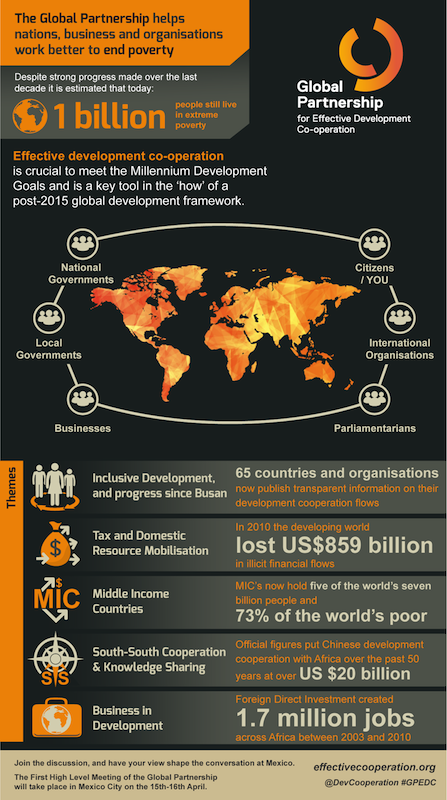The short answer: No!
As ministers and delegates from all over the world gather on April 15th and 16th in Mexico City to discuss progress in international development, they will be hawking an ambitious agenda.
They want wider participation by citizens, who often know better what will work and what won’t. They want to ensure that development initiatives are owned and led by countries, not imposed by donors or technocrats bearing idealistic blueprints or prescriptions that, in the end, almost never work. They want a new transparency that shows not just how money is being used by recipients, but also how donors’ policies are working. They want to learn from failure and share knowledge more effectively among countries. And they want to track their progress, set concrete goals and demonstrate results.
The big question is this: How are they going to do all of this without strong local media?

Source: The Global Partnership
If the world’s leaders are serious about making progress in international development, it is clear that strong local media has an important role to play. And the media sector will need to be one of the areas that receive support from donors if it is to realize its full potential to support the development agenda.
Yet as the 1500 ministers and other delegates gather for the “First High-Level Meeting of the Global Partnership for Effective Development Cooperation,” very little is being said about media development. The draft document that has been released ahead of the meeting does not contain the word media. And though the ministers are likely to signal that disclosure and transparency are critical to monitoring progress, the delegates have not done much thinking about how to translate transparency into practical knowledge that can be used by ordinary citizens.
All is not lost…yet. The meeting in Mexico is just the latest in a series of big international meetings where media development advocates are trying to get media on the agenda. The next important goalpost is the discussion about creating a new set of goals to replace the Millennium Development Goals that will expire in 2015.
One hopeful sign is that the organizers of the Mexico meeting have allowed a group of leading media development organizations to schedule a side-event at the meeting, a short discussion in the sidelines that will look at the role of media.
The Center of International Media Assistance, BBC Media Action, the Global Forum for Media Development, USAID and other organizations are organizing the discussion that will be open to all delegates. Speakers from several developed and developing countries will be on the panel, and the hope is that the panelists from the media session will help spread their messages into the broader proceedings.
…the media sector will need to be one of the areas that receive support from donors if it is to realize its full potential to support the development agenda.
A more deliberate and integrative approach to media development would be a critical pathway for the international community to address some of the key weaknesses that have been identified in overall aid effectiveness. Practically speaking, this means some important changes in the way media development is carried out, including the following:
- Integrating media into the overall planning and diagnostic processes where developing countries and their partners decide on priorities and approaches
- Building and maintaining support for domestic groups that are trying to build high-quality, independent and trustworthy media
- Making support to media development a more explicit goal of the global partnership, the effective institutions platform, and other global and regional processes
- Developing better ways to track and measure results from media development initiatives, along with other indicators of development
Don’t hold your breath. The upcoming release of Freedom House’s press freedom indicators next month will certainly show the continued deterioration in conditions for the media. And countries like China, Russia, and many others are downright hostile to this agenda. But even if the goal of making media a core part of the development agenda remains a work in progress, CIMA and its partners will be there, trying to make the case and convince as many countries as will listen.

Comments (0)